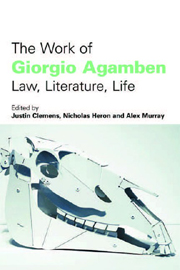Book contents
- Frontmatter
- Contents
- Acknowledgements
- Notes on Contributors
- The Enigma of Giorgio Agamben
- 1 K
- 2 Integral Actuality: On Giorgio Agamben's Idea of Prose
- 3 The Role of the Shifter and the Problem of Reference in Giorgio Agamben
- 4 ‘Its Silent Working was a Delusion’
- 5 Politics and Poetics of Divine Violence: On a Figure in Giorgio Agamben and Walter Benjamin
- 6 Idea of Poetry, Idea of Prose
- 7 The Fading Memory of Homo non Sacer
- 8 Soulblind, or On Profanation
- 9 Face to Face with Agamben; or, the Other in Love
- 10 Beyond Spectacle and the Image: the Poetics of Guy Debord and Agamben
- 11 Dismantling Theatricality: Aesthetics of Bare Life
- 12 Notes on Media and Biopolitics: ‘Notes on Gesture’
- Index
10 - Beyond Spectacle and the Image: the Poetics of Guy Debord and Agamben
Published online by Cambridge University Press: 12 September 2012
- Frontmatter
- Contents
- Acknowledgements
- Notes on Contributors
- The Enigma of Giorgio Agamben
- 1 K
- 2 Integral Actuality: On Giorgio Agamben's Idea of Prose
- 3 The Role of the Shifter and the Problem of Reference in Giorgio Agamben
- 4 ‘Its Silent Working was a Delusion’
- 5 Politics and Poetics of Divine Violence: On a Figure in Giorgio Agamben and Walter Benjamin
- 6 Idea of Poetry, Idea of Prose
- 7 The Fading Memory of Homo non Sacer
- 8 Soulblind, or On Profanation
- 9 Face to Face with Agamben; or, the Other in Love
- 10 Beyond Spectacle and the Image: the Poetics of Guy Debord and Agamben
- 11 Dismantling Theatricality: Aesthetics of Bare Life
- 12 Notes on Media and Biopolitics: ‘Notes on Gesture’
- Index
Summary
In the opening to a short essay on the metropolis Agamben relates the following story:
Many years ago I was having a conversation with Guy (Debord) which I believed to be about political philosophy, until at some point Guy interrupted me and said: ‘Look, I am not a philosopher, I am a strategist’. This statement struck me because I used to see him as a philosopher as I saw myself as one, but I think that what he meant to say was that every thought, however ‘pure’, general or abstract it tries to be, is always marked by historical and temporal signs and thus captured and somehow engaged in a strategy and urgency.
The fact that Debord rejected Agamben's discussion of ‘political philosophy’ over ‘strategy’ is a distinction that is important to maintain. What is at stake here is not a debate over the proper disciplinary boundaries within which we should approach Agamben's work, a debate which obfuscates the nature of the work itself. Instead I would like to use the distinction as for both Debord and, I would suggest, Agamben, it sustains both the necessity and the potential for a critique, a ‘poetics’ that exists in a symbiotic relation with the category of life.
The importance of Debord in Agamben's work has been observed by a number of critics, yet the relationship has, as yet, not been explored in any great depth. If the reasons for this are unclear, I would suggest it centres around questions of Agamben’s political philosophy and the rather strange place occupied by Debord in contemporary critical theory, and perhaps more importantly in recent French politics.
- Type
- Chapter
- Information
- The Work of Giorgio AgambenLaw Literature Life, pp. 164 - 180Publisher: Edinburgh University PressPrint publication year: 2008



